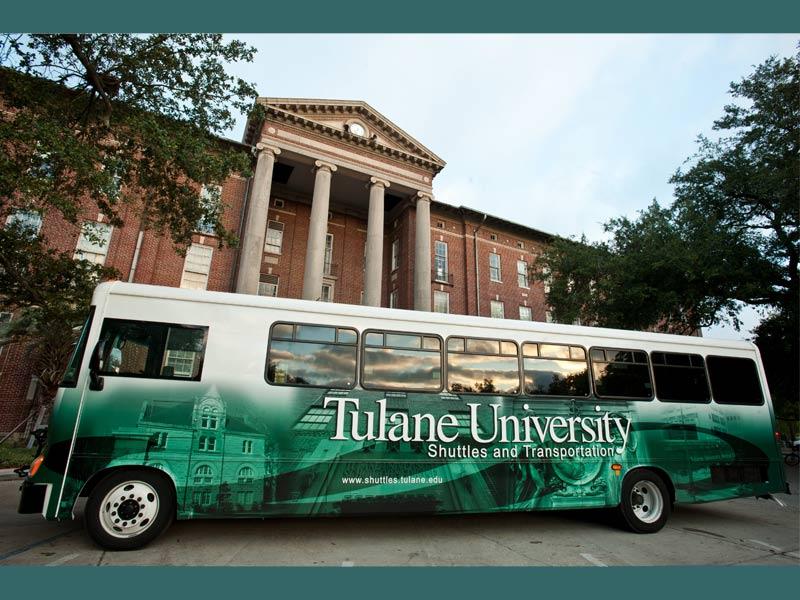Tulane University receives award to demonstrate electric shuttle buses for New Orleans region
A Tulane University initiative to use shuttle buses powered by electricity has been awarded $737,500 by the U.S. Department of Energy’s Office of Energy Efficiency and Renewable Energy (EERE). The project is one of 55 selected research and demonstration projects that will further new and innovative advanced vehicle technologies with assistance from the EERE’s Vehicle Technologies Office.
Tulane will purchase five Grande West Vicinity transit buses with electric vehicle (EV) technology and install five private charging stations to support them. The shuttle buses will service the regular university shuttle route that links Tulane’s uptown and downtown campuses and affiliate programs. During the three-year project, Tulane staff will collect and analyze data on the operating performance and costs of the EV shuttle buses, with the goal of sharing Tulane’s experience with fleet managers in the New Orleans region and at other universities.
The project team will test expectations that the EV shuttle buses are less expensive to operate and maintain. The vehicles use EV technology that is widely used in full-size buses but has only recently become available in a smaller transit model. “Working with our bus provider, Alliance Bus Group, we had identified the Vicinity electric shuttle bus as the most promising model for our next purchase,” said Brian Lowe, director of Tulane Transportation and Parking. “The DOE funding gives us support to move forward now.”
The project is a collaboration between Tulane University Campus Services and the Tulane ByWater Institute, which advances applied, interdisciplinary research and community engagement initiatives around coastal resilience and the urban environment, and local partners Alliance Bus Group, Entergy and the Southeast Louisiana Clean Fuel Partnership. The Southeast Louisiana Clean Fuel Partnership, administered by the New Orleans Regional Planning Commission, works with vehicle fleets, fuel providers, community leaders and other stakeholders to save energy and promote the use of domestic alternative fuels and advanced vehicle technologies in transportation.
“This is an exciting opportunity for Tulane as we work to reduce the greenhouse gas emissions that result from university operations,” said Patrick Norton, Tulane’s senior vice president and chief operating officer. “Tulane’s shuttles are highly visible in the greater New Orleans area and our ridership averages over 160,000 annually. We are confident that the impacts of this project will extend beyond the boundaries of our physical campuses. By sharing our operational, financial and environmental impact experiences and data, we hope to serve as a blueprint for other institutions in our region.”
Moving to electric vehicles is a solution that addresses both the local health impacts of air pollution and the global impacts of climate change. “In the short term, using EV shuttle buses will eliminate pollutants in the exhaust of diesel fuel, which contribute to air pollution that has local health impacts, such as lung and heart damage,” said Liz Davey, director of Tulane’s Office of Sustainability. Davey and Shelley Meaux, assistant director of the Bywater Institute, are the project’s principal investigators. “In the longer term, especially as electricity generation moves to more clean and renewable sources, the use of electric vehicles will also reduce our carbon footprint.”
“Part of a clean energy future for New Orleans includes the electrification of transportation,” said Seth Cureington, Entergy New Orleans economic development and technology innovation director. “Tulane University’s shuttle bus project is an example of how Entergy New Orleans can partner with organizations and businesses in support of their sustainability goals.”
“Always ahead of the curve, Tulane was one of the first universities in the region to install EV charging stations on campus for students, faculty and staff,” said Courtney Young, director of the Southeast Louisiana Clean Fuel Partnership. “Similarly, the electric shuttle bus project is the first of its kind in our area, so we’re looking forward to understanding and showcasing results to comparable fleets as a potential replicable solution to replace the older model, highly polluting diesel shuttles in our communities.”

